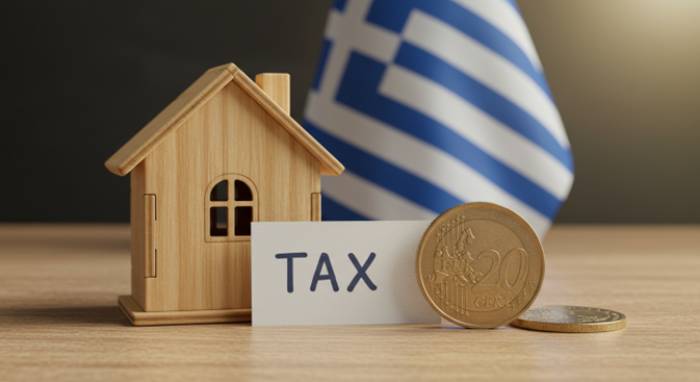All you need to know about Property Tax in Greece

If you are considering property purchases in Greece, whether for residence, investment, or the Golden Visa program, it is essential to familiarise yourself with the property tax system in Greece. Property tax law in Greece can be confusing, most especially for foreigners and non-residents with no formal experience of how the property tax system works. However, with the right guidance and assistance, property tax is one of the more straightforward parts of the process.
Greece is an emerging destination for buyers from all over the world, with attractive landscapes, low-priced real estate, and many residency options. Before making a property purchase or relocating to Greece, you should be aware of the implications regarding Greek property taxes. Being informed about your annual tax liabilities to municipal taxes is a good form of defense against unexpected expenses and legal issues with compliance.
iLand specializes in assisting foreign property purchasers at all levels of ownership to residential property in Greece. If you are asking how to pay Greek property taxes for non-residents or you need assistance understanding Greece property tax laws for non-residents, we will make things much easier for you to find suitable expert solutions.
What Does Property Tax in Greece Include?
Property taxes in Greece are composed of several different components that all types of property owners, Greek or foreign investments, need to be aware of. Each type of tax has its own calculation, payment period and legal implication. Here is a summary of the most common property-related taxes:
1. ENFIA Annual Property Tax
ENFIA (Uniform Real Estate Property Tax) is the primary tax levied on all property in Greece annually. ENFIA is calculated considering parameters such as location, surface area, surface area of the property, age, and use of the property. The basic tax rate starts at €2 to €16 sq/m. There is an added "supplementary tax" for owners when the total property value exceeds €250,000. ENFIA also applies to foreigners as owners of property in Greece, it is likely to be the most important recurring cost to be aware of.
2. Property Transfer Tax
If you buy property in Greece for residence, you will be subject to a one-time property transfer tax. The property transfer tax is currently charged at a rate of 3.09% of the officially assessed value of the property. The tax must be paid before the signature of the final contract. This is to be paid by the buyer. It is important to note that both residents and non-residents of Greece are subject to this tax so if you are a foreigner planning to invest in real estate: be prepared for this upfront cost.
3. Municipal Property Taxes
Local municipalities charge small property-related taxes, which are usually included in your electricity bills. These taxes contribute to public services like waste collection and lighting.
The rates range between 0.025% and 0.035% of the property's assessed value.
Although small, they are mandatory and must be paid on a regular basis.
4. Value Added Tax (VAT) on New Properties
If you're buying a newly built property (with a building permit issued after January 2006), a 24% VAT may apply instead of the 3.09% transfer tax.
However, a VAT exemption is currently in place for new builds until the end of 2025, offering a potential tax advantage for buyers during this period.
5. Income Tax on Rental Earnings
If you rent out your property, rental income in Greece is taxed on a progressive scale. The current scale for 2025 is:
15% on annual rental income up to €12,000
35% on annual rental income from €12,001 to €35,000
45% on annual rental income above €35,000
Important — change effective from 2026:
A tax reform taking effect from January 1, 2026 introduces an intermediate 25% rate for the bracket €12,001–€24,000. This closes the sharp jump between 15% and 35% and reduces the tax burden for many small and medium landlords.
Examples (comparison 2025 vs 2026):
Example 1: Annual rental income €15,000
2025: 12,000 × 15% = €1,800; 3,000 × 35% = €1,050; Total = €2,850
2026: 12,000 × 15% = €1,800; 3,000 × 25% = €750; Total = €2,550 (Benefit: €300)
Example 2: Annual rental income €20,000
2025: 12,000 × 15% = €1,800; 8,000 × 35% = €2,800; Total = €4,600
2026: 12,000 × 15% = €1,800; 8,000 × 25% = €2,000; Total = €3,800 (Benefit: €800)
Example 3: Annual rental income €25,000
2025: 12,000 × 15% = €1,800; 12,000 × 35% = €4,200; 1,000 × 35% = €350; Total = €6,350
2026: 12,000 × 15% = €1,800; 12,000 × 25% = €3,000; 1,000 × 35% = €350; Total = €5,150 (Benefit: €1,200)
Note: examples above show gross rental income and assume no other deductible costs. Deductions for eligible long-term lettings still apply where allowed by Greek tax rules.
How is Property Income Tax in Greece Calculated?

If you are going to rent out your Greek property for the longer term to a tenant, or for temporary use (e.g., Airbnb), one of the main questions is how the rental income is taxed. Rental income taxes in Greece apply to residents and foreigners and are on your annual gross rental property income.
Here's how:
Rental income in Greece is taxed progressively. For 2025 the rules are:
15% on the first €12,000 of annual rental income
35% on income from €12,001 to €35,000
45% on income above €35,000
Planned change from 2026:
From 1 January 2026 a new intermediate rate of 25% will apply to the band €12,001–€24,000, which smooths the previous jump between 15% and 35%.
Example (comparison 2025 vs 2026) — rental income €20,000/year:
2025: 12,000 × 15% = €1,800; 8,000 × 35% = €2,800; Total = €4,600
2026: 12,000 × 15% = €1,800; 8,000 × 25% = €2,000; Total = €3,800
Net benefit from 2026: €800
Keep in mind these calculations are on gross rental income. Eligible expense deductions (mainly for long-term lettings) can lower taxable income where permitted.
Can You Deduct Expenses?
Yes, if you are renting property long-term, you may be able to deduct certain expenses for maintenance and operation of the property (such as repairs, property management fees, utility bills that are paid by the owner, etc.), though this is at the discretion of the Greek tax authorities.
If you are renting property for short-term rentals (Airbnb, etc.), then there are limited\no deductions available to you, especially if you do not operate as a licensed business yet.
What About Double Taxation?
Greece has tax treaties with many countries, including the US, Canada and EU member states, to prevent double taxations. This means that you may not be taxed again on rental income in your home country (or may receive a tax credit) if you've already paid tax on that income in Greece.
iLand's Tax Support for Foreign Property Owners
Managing property tax in Greece for foreigners can get complicated, especially when it involves rental income, deductible costs, and cross-border tax laws. That's why iLand offers full support services:
Registration and filing of rental income tax
Calculation of deductible expenses
Coordination with your tax advisor abroad to avoid double taxation
Setting up business structures (if needed) for Airbnb-style rentals
Whether you own one rental apartment or a portfolio of properties in Greece, our tax experts ensure everything is done correctly and in your best financial interest.
If you want to know how to get a Greece Residence Permit Card, you can contact us today.
Property Purchase and Transfer Tax in Greece
Upon buying property in Greece, among the most significant costs to include in the transaction, apart from the real estate itself, is the transfer tax. This is a one-time payment to the government upon transferring title to real property. For both resident and foreign buyers, the tax is uniformly applied and included in the overall purchase price.
How Much is the Transfer Tax?
The standard tax on the transfer of property in Greece is 3.09% of the officially assessed value (the "objective value") of the immovable. In most cases, this value is close to or less than the actual market value.
Paid by the buyer, not the seller.
Must be paid before it is possible to sign the final deed at the notary's office.
For instance, In the case of buying a €250,000 property, your transfer tax would be approximately €7,725. For foreigners navigating the Greek real estate market, having local, experienced professionals by your side is essential to ensure compliance and avoid unnecessary delays or surprises.
How Much Is the Property Tax in Greece for Foreigners?
Foreigners buying or renting property in Greece pay the same taxes as Greeks—but understanding these rules from a different country can be challenging. Below, we define the two main tax types international buyers need to be aware of: tax on property purchase and tax on rental income.
1. Property Purchase Tax in Greece
When purchasing property in Greece, foreigners pay one tax, the transfer tax. This is a normal part of the property buying process.
Transfer Tax (Resale Properties)
Rate: 3.09% of the objective (assessed) value of property
Who pays it? Buyer (foreign or local)
When is it paid? Whenever the notary signs the deed of the property
Example: If you buy a property worth €200,000, your transfer tax amounts to €6,180.
VAT (New Properties)
For newly constructed properties (permitted after January 2006), a 24% VAT tax is usually applicable instead of the 3.09% transfer tax.
However, until December 31, 2025 VAT is frozen; therefore allowing foreign buyers to utilize a 3.09% transfer tax instead, allowing a great opportunity for investors.
2. Tax on Rental Income of Foreigners
If you are renting out your Greek property, be it long-term or short-term (like Airbnb), such rental income is taxed in Greece regardless of your domicile.
Tax Rates of Rental Income (2025) — and change from 2026
For 2025 the rental income tax schedule is:
15% on income up to €12,000
35% on income between €12,001 and €35,000
45% on income above €35,000
From 1 January 2026, a new 25% rate will apply to the band €12,001–€24,000, reducing the previous jump from 15% to 35%.
Example — €20,000 yearly rental income:
2025: 12,000 × 15% = €1,800; 8,000 × 35% = €2,800; Total = €4,600
2026: 12,000 × 15% = €1,800; 8,000 × 25% = €2,000; Total = €3,800
Expenses Deductions
If you rent your property in the long term, you are allowed to claim certain costs, such as maintenance, management fees, and a few utilities. If you rent your property short-term (and you don't have an established business), your deductions are limited.
Double Taxation Treaties
Greece has entered into double taxation treaties with several countries (i.e. U.S., Canada, UK, Germany, etc.). As such, you might qualify for some credit for taxes paid in Greece when you do your tax return at home.
iLand: Full-Service Support for Foreign Property Owners
Navigating property tax in Greece for foreigners—from acquisition taxes to income reporting can be overwhelming without local expertise. At iLand, we offer complete end-to-end support:
Tax estimation before purchase
Payment and filing of transfer and rental income taxes
Coordination with accountants, lawyers, and tax advisors
Assistance with residency or the Greece Golden Visa Program, if applicable
Let us help you buy and manage your property in Greece with confidence and clarity.
How to Pay Property Tax in Greece
Paying Greek property taxes for non-residents is relatively straightforward with the right guidance. As a property owner in Greece, whether you are a resident or a foreigner, you are required to pay one annual real estate tax, known as ENFIA (Uniform Real Estate Ownership Tax). The Greek tax system is 100% digitalized, and yes, you can pay online at any time.
What Is ENFIA?
ENFIA is the primary annual Greek property tax for non-residents and applies to all properties, regardless of ownership, including those owned by foreigners and non-residents. The tax is calculated based on several factors:
Geographical location (zone value)
Size of the property and age
The way the property is used, i.e., residential or commercial
Percentage of ownership
The ENFIA tax generally ranges between €2 and €16 per square meter, with an additional "supplementary" tax for total holdings exceeding €250,000.
How to Pay Property Tax in Greece – Step by Step
Obtain a Greek Tax ID (AFM)
To own and pay tax on property in Greece, you must first get a Tax Identification Number (AFM). iLand can help you secure this as part of our client onboarding.
Register on the Taxisnet Portal
All tax payments in Greece are processed via the official Taxisnet platform (www.aade.gr). You'll need a login and digital credentials to access your tax profile.
View Your ENFIA Assessment
Once you own a property, the Greek tax office will generate your annual ENFIA bill. You can log in to Taxisnet and download it as a PDF. The system will also generate a unique Payment ID (QR Code or RF Code).
Make the Payment
You can pay your Greek property taxes in one of the following ways:
Online banking (from a Greek or international bank)
At a Greek bank branch
Via mobile apps or international wire transfer
By using an authorized accountant or legal representative in Greece
The ENFIA amount can be paid in full or in up to 10 interest-free monthly instalments.
Can Foreigners Pay Online from Abroad?
Yes, even non-residents can pay Greek property taxes online, as long as they:
Have access to their Taxisnet account
Use international online banking or work with a Greek financial proxy (e.g., lawyer, accountant)
When Is ENFIA Due?
ENFIA is usually issued in September and is payable over 10 months (Sept–June of the following year). Timely payment is essential to avoid penalties or legal complications.
How Often Should You Pay the Greece Property Tax?
In Greece, property tax is paid annually, but you don't have to pay the full amount all at once. The tax authority provides a structured timeline to make the process more manageable for both residents and foreign property owners.
Annual ENFIA Payment Schedule
The main recurring Greece property tax is ENFIA (Uniform Real Estate Ownership Tax), which is issued once a year. Here's how the timeline works:
ENFIA is assessed annually, usually in August or September.
Payment is typically spread over up to 10 monthly installments from September to June of the following year.
You may also choose to pay the full amount at once if preferred.
Example: If your ENFIA for the year is €1,000, you can either:
Pay €100 per month over 10 months
Or pay the full €1,000 upfront
These payments can be made online via Greek banks or arranged through a local accountant or legal representative, such as the services offered by iLand.
One-Time Taxes: When Are They Due?
In addition to annual ENFIA, you may be responsible for one-time property-related taxes, such as:
Property Transfer Tax – Paid once before signing the purchase deed (typically 3.09% of the assessed value)
VAT on New Builds (if applicable) – Also paid once at the time of purchase (currently suspended until the end of 2025)
Capital Gains Tax (if reselling, currently suspended but may return) – Paid after selling a property
Presumptive (Imputed) Income — Living-Standards Presumptions (change from 2026)
Separate from rental-income rates, the Greek tax authorities also use “living standards” presumptions (imputed income) to estimate taxable income for certain taxpayers. A reform taking effect from 2026 reduces the imputed values used for these presumptions by 30%.
Examples of the 30% reduction:
A residence currently imputed at €4,000 will be calculated at €2,800.
A 1,600 cc car currently imputed at €5,200 will be calculated at €3,640.
An average household (home + car) with total imputed income €9,200 will see this fall to €6,440— producing an estimated presumptive tax benefit of around €1,200. For households with larger assets the benefit could reach up to approximately €1,600.
Note: This measure is distinct from the rental-income bracket change (25% band) and targets taxpayers assessed under the living-standards presumptions rather than the computation of rental income tax.
At iLand, we help foreign property owners stay informed about and compliant with all their tax obligations in Greece. From setting up instalment plans to making timely payments through authorised representatives, we ensure that nothing gets missed, no matter where you live.
Which country has the cheapest citizenship by investment in Europe? If you want to know, read our other article.
Conclusion: Simplify Greek Property Taxes with iLand
Navigating property tax in Greece for foreigners from initial purchase to ongoing income reporting can be complex, especially if you're managing everything from abroad. That’s where iLand steps in not just as a real estate facilitator, but as a full-scope advisor based entirely in Greece.
News
Keep up with the latest updates on the industry of real estate investments.

























2 comments
Hello, I'm currently building a house in Kefalonia with a rough finishing date around February 2026 and then a further year to finish the pool and walls etc. reading your website, would this be classed as a new build and be charged 24% on the total cost of the build, or is a new build something that you have bought ready made?
In reply to Hello, I'm currently… by Nicos Nicolaou
PermalinkDear Nicos,
Yes, your property will be classed as a new build. In Greece, new builds (with permits after 2006) are normally subject to 24% VAT on the first sale by the developer. However, there is a temporary suspension of VAT until the end of 2025, where instead buyers pay only about 3.09% transfer tax—but this applies only if the developer opts in. Since your house will complete in 2026, the suspension may no longer apply unless the law is extended, meaning the 24% VAT is most likely. We recommend confirming with your builder and a local tax advisor.